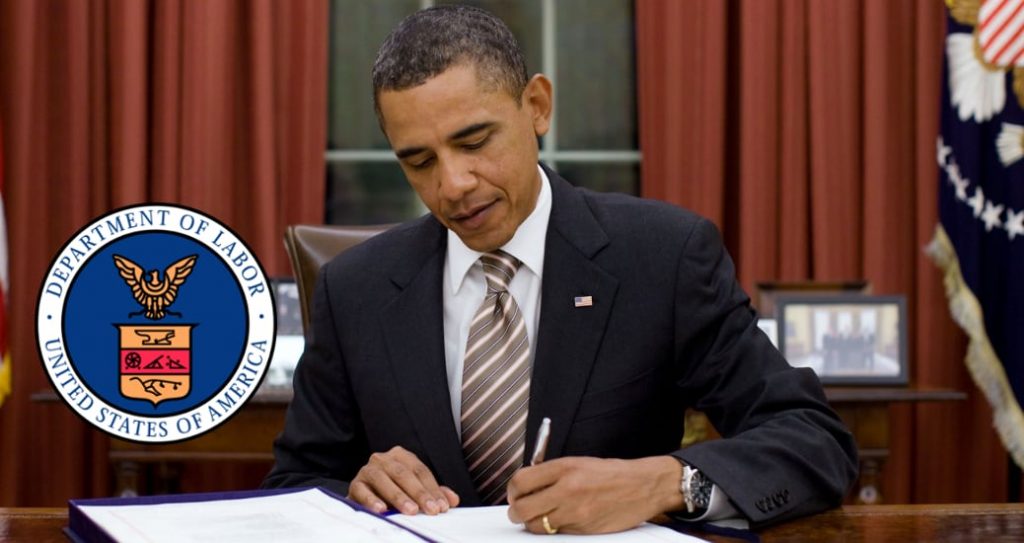Unless you’ve been living under a rock, you know that the U.S. just underwent one of the most contentious elections in its history. The status of may current and proposed laws is now uncertain as we prepare for the shift in administrations. The country remains on edge as we wait to see how things play out in the coming weeks and months as President-elect Trump prepares to take office and ultimately is sworn in as Commander-in-Chief.
A number of current laws appear to be on the chopping block. With Trump promising to undo major legislation enacted by President Obama, including the Affordable Care Act, in his first 100 days, many fear that several of the legal protections currently in place will soon be a thing of the past.
Now, it looks like we won’t have to wait for the new administration to be sworn in for the changes to start rolling out. On November 22, 2016, a federal judge issued an injunction blocking new overtime pay rules passed by President Obama earlier this year and set to take effect on December 1.
The Overtime Laws at Stake
In May 2016, the President announced sweeping reforms to the current overtime laws that would result in millions of additional Americans receiving overtime pay. Under the present laws, hourly workers are automatically entitled to overtime pay at the rate of time-and-a-half when they work more than 40 hours a week. However, whether salaried workers are entitled to receive overtime pay depends on their income levels and the nature of their job duties. The new rules would extend overtime pay to far more workers than the current rules allow.
Presently, salaried employees who earn less than $23,600 per year are entitled to overtime pay at a rate of at least time-and-a-half for hours worked over 40 hours. The reforms raised that threshold to $47,476 per year, extending automatic overtime pay to a much larger pool of workers.
The new rules expanded overtime pay on the high end of the salary spectrum as well. Previously, “highly compensated employees” who were subject to a minimal duties test and earned over $100,000 per year were exempt from receiving overtime pay. The new reforms were set to raise that benchmark to $134,004 per year.
The overtime pay reforms were expected to impact approximately 4.2 million American workers
Challenges to the Reforms
As soon as the new overtime rules were announced, they were faced with strong opposition. Business groups and Republican members of Congress vowed to fight their implementation.
In October, the attorneys general from 21 states sought an emergency preliminary injunction against the new overtime rules in federal court in Texas. The effort was widely viewed as a partisan one, as all of the states involved have Republican governors or attorneys general.
The states’ challenge questioned the constitutionality of the rule changes, claiming that the U.S. Department of Labor overstepped its authority in promulgating the new rules. The states argued that the new changes would force employers to eliminate services and terminate employees. They also contended that the new laws would cause irreversible budget damage and impede on the states’ rights to make policy choices about government functions, in violation of the Tenth Amendment.
The lawsuit sought an emergency injunction that would delay the new laws from taking effect until there could be a full hearing on the merits and a chance for higher court review.
On the same day, more than 50 business groups also filed a challenge to the new overtime rules, contending that the Department of Labor’s justifications for the new salary thresholds were not a permissible construction of the Fair Labor Standards Act. The two cases were consolidated.
The Court Injunction
Under the Texas court’s November 22 ruling, businesses who were expected to be compliant with the newly promulgated overtime rules as of December 1 have been granted a reprieve. In issuing the nationwide injunction, U.S. District Judge Amos L. Mazzant III determined that the states and business groups who brought the suit stood a significant chance of succeeding on their claims, and that the Obama administration would likely be found to have overstepped its authority in changing the salary thresholds for overtime pay. The court further stated that the petitioners faced potentially serious financial harm if the new rules were to take effect on December 1 as planned.
Mazzant rejected the Obama administration’s arguments that the new laws were merely updates meant to keep wages in line with the modern economy. He also rejected the state’s argument that the overtime rules didn’t apply to them at all, citing Supreme Court precedent that labor laws do, in fact, apply to the states.
The ruling does not overrule the new laws or deem them unconstitutional; it merely delays their implementation. The challenges will now proceed through the courts, a process that could take a long time.
The Department of Labor has expressed strong disagreement with the court’s decision and confidence in the new rules’ legality. It has the right to appeal the decision to the United States Court of Appeals for the Fifth Circuit, an option it is reportedly considering. However, that appeal could later be dropped if the Department sees a shake up after President-elect Trump takes office in January.
So, What Now?
Not surprisingly, reactions to the court injunction have been mixed. Major industry lobbies immediately praised the ruling. Workers’ rights groups, on the other hand, were disheartened, seeing the injunction as a roadblock to much-needed wage and labor reforms.
The overtime reforms were widely viewed as one of the departing President’s signature achievements in the wage and labor arena. The new thresholds represented the first significant change in overtime pay rules in nearly four decades.
The new overtime rules were expected to have an impact on almost every sector of the nation’s economy, with the greatest impact being felt by nonprofit groups, hotels and restaurants, and retail companies – businesses who typically have the highest number of management workers with salaries below the new limits. While many employers have been heartened by the court’s ruling, many workers are deeply disappointed by the injunction.
And while the injunction, in theory, merely delays the implementation of the new overtime rules rather than striking them down in their entirety, many suspect that the future of the new law is bleak. First, many analysts read the judge’s language in the injunction ruling as an indication that he is likely to strike down the regulation when the case is fully heard.
Perhaps more importantly, the fate of the new overtime rules has been in question since the election. President-elect Trump has made clear his intention to overturn many of the laws and regulations approved by the Obama administration, and the overtime rules are no exception. Congress is already on record as having criticized the expansion of the rules.
Supporters of the new rules had hoped they would take effect as soon as possible, believing that this would make them less likely to be overturned. The thinking is that, had the rules already taken effect, it would be harder to reverse them, because to do so would be to essentially take away overtime rights and pay from millions of workers. Such a move would seem like a major contradiction for Trump, who painted a picture of himself as a champion of the working class during his Presidential campaign. An overturning of the rules is theoretically much simpler when the rules in question have never actually taken effect.
Another complication arises from the fact that several large employers have already raised the salaries of some workers over the $47,476 threshold of the new rules, in anticipation that the laws would be going into effect. The reasoning behind the raises was that increasing salaries was more cost-effective than paying those same employees overtime. Employers rarely reverse such pay raises, for fear of looking bad. Some critics question whether these employers might now support overtime pay laws that would effectively force similar salary increases upon rival companies.
The ultimate fate of the overtime pay rules, and whether the present or other reforms will eventually be put in place, remains to be seen. For now, employers are off the hook in terms of having to pay additional overtime wages starting December 1.
If you have questions about the overtime rules governing your employees, contact Pasha Law today for more information.

![California v. Texas: Which is Better for Business? [313]](https://www.pashalaw.com/wp-content/uploads/2021/07/Pasha_LSSB_CaliforniaVSTexas-1024x723.jpg)





![[UPDATED] Aetna Kicking Providers Out of its Network for Promoting Patient Choice pasha law healthcare services](https://www.pashalaw.com/wp-content/uploads/2019/02/Aetna-Kicking-Providers-Out-of-its-Network-for-Promoting-Patient-Choice-Pasha-Law-1024x683.jpg)






![Law in the Digital Age: Exploring the Legal Intricacies of Artificial Intelligence [e323]](https://www.pashalaw.com/wp-content/uploads/2023/11/WhatsApp-Image-2023-11-21-at-13.24.49_4a326c9e-300x212.jpg)
![Unraveling the Workforce: Navigating the Aftermath of Mass Layoffs [e322]](https://www.pashalaw.com/wp-content/uploads/2023/07/Untitled-design-23-300x212.png)
![Return to the Office vs. Remote: What Can Employers Legally Enforce? [e321]](https://www.pashalaw.com/wp-content/uploads/2023/01/Pasha_LSSB_321_banner-300x212.jpg)
![Explaining the Hans Niemann Chess Lawsuit v. Magnus Carlsen [e320]](https://www.pashalaw.com/wp-content/uploads/2022/10/LAWYER-EXPLAINS-7-300x169.png)
![California v. Texas: Which is Better for Business? [313]](https://www.pashalaw.com/wp-content/uploads/2021/07/Pasha_LSSB_CaliforniaVSTexas-300x212.jpg)
![Buyers vs. Sellers: Negotiating Mergers & Acquisitions [e319]](https://www.pashalaw.com/wp-content/uploads/2022/06/Pasha_LSSB_BuyersVsSellers_banner-300x212.jpg)
![Employers vs. Employees: When Are Employment Restrictions Fair? [e318]](https://www.pashalaw.com/wp-content/uploads/2022/05/Pasha_LSSB_EmployeesVsEmployers_banner-1-300x212.jpg)
![Vaccine Mandates Supreme Court Rulings [E317]](https://www.pashalaw.com/wp-content/uploads/2022/02/WhatsApp-Image-2022-02-11-at-4.10.32-PM-300x212.jpeg)
![Business of Healthcare [e316]](https://www.pashalaw.com/wp-content/uploads/2021/11/Pasha_LSSB_BusinessofHealthcare_banner-300x212.jpg)
![Social Media and the Law [e315]](https://www.pashalaw.com/wp-content/uploads/2021/10/WhatsApp-Image-2021-10-06-at-1.43.08-PM-300x212.jpeg)
![Defining NDA Boundaries: When does it go too far? [e314]](https://www.pashalaw.com/wp-content/uploads/2021/09/Pasha_LSSB_NDA_WordPress-2-300x212.jpg)
![More Than a Mistake: Business Blunders to Avoid [312] Top Five Business Blunders](https://www.pashalaw.com/wp-content/uploads/2021/06/Pasha_LSSB_Blunders_WP-1-300x212.jpg)
![Is There a Right Way to Fire an Employee? We Ask the Experts [311]](https://www.pashalaw.com/wp-content/uploads/2021/02/Pasha_LSSB_FireAnEmployee_Website-300x200.jpg)
![The New Frontier: Navigating Business Law During a Pandemic [310]](https://www.pashalaw.com/wp-content/uploads/2020/12/Pasha_LSSB_Epidsode308_Covid_Web-1-300x200.jpg)
![Wrap Up | Behind the Buy [8/8] [309]](https://www.pashalaw.com/wp-content/uploads/2020/11/Pasha_BehindTheBuy_Episode8-300x200.jpg)
![Is it all over? | Behind the Buy [7/8] [308]](https://www.pashalaw.com/wp-content/uploads/2020/09/iStock-1153248856-overlay-scaled-300x200.jpg)
![Fight for Your [Trademark] Rights | Behind the Buy [6/8] [307]](https://www.pashalaw.com/wp-content/uploads/2020/07/Fight-for-your-trademark-right-300x200.jpg)
![They Let It Slip | Behind the Buy [5/8] [306]](https://www.pashalaw.com/wp-content/uploads/2020/06/Behind-the-buy-they-let-it-slip-300x200.jpg)
![Mo’ Investigation Mo’ Problems | Behind the Buy [4/8] [305]](https://www.pashalaw.com/wp-content/uploads/2020/05/interrobang-1-scaled-300x200.jpg)
![Broker or Joker | Behind the Buy [3/8] [304] Behind the buy - Broker or Joker](https://www.pashalaw.com/wp-content/uploads/2020/04/Joker-or-Broker-1-300x185.jpg)
![Intentions Are Nothing Without a Signature | Behind the Buy [2/8] [303]](https://www.pashalaw.com/wp-content/uploads/2020/04/intentions-are-nothing-without-a-signature-300x185.jpg)
![From First Steps to Final Signatures | Behind the Buy [1/8] [302]](https://www.pashalaw.com/wp-content/uploads/2020/04/first-steps-to-final-signatures-300x185.jpg)
![The Dark-side of GrubHub’s (and others’) Relationship with Restaurants [e301]](https://www.pashalaw.com/wp-content/uploads/2015/04/When-Competition-Goes-Too-Far-Ice-Cream-Truck-Edition-300x201.jpg)
![Ultimate Legal Breakdown of Internet Law & the Subscription Business Model [e300]](https://www.pashalaw.com/wp-content/uploads/2019/05/Ultimate-Legal-Breakdown-of-Internet-Law-the-Subscription-Business-Model-300x196.jpg)
![Why the Business Buying Process is Like a Wedding?: A Legal Guide [e299]](https://www.pashalaw.com/wp-content/uploads/2019/03/futura-300x169.jpg)
![Will Crowdfunding and General Solicitation Change How Companies Raise Capital? [e298]](https://www.pashalaw.com/wp-content/uploads/2018/11/Will-Crowdfunding-and-General-Solicitation-Change-How-Companies-Raise-Capital-300x159.jpg)
![Pirates, Pilots, and Passwords: Flight Sim Labs Navigates Legal Issues (w/ Marc Hoag as Guest) [e297]](https://www.pashalaw.com/wp-content/uploads/2018/07/flight-sim-labs-300x159.jpg)
![Facebook, Zuckerberg, and the Data Privacy Dilemma [e296] User data, data breach photo by Pete Souza)](https://www.pashalaw.com/wp-content/uploads/2018/04/data-300x159.jpg)
![What To Do When Your Business Is Raided By ICE [e295] I.C.E Raids business](https://www.pashalaw.com/wp-content/uploads/2018/02/ice-cover-300x159.jpg)
![General Contractors & Subcontractors in California – What you need to know [e294]](https://www.pashalaw.com/wp-content/uploads/2018/01/iStock-666960952-300x200.jpg)
![Mattress Giants v. Sleepoplis: The War On Getting You To Bed [e293]](https://www.pashalaw.com/wp-content/uploads/2017/12/sleepopolis-300x159.jpg)
![The Harassment Watershed [e292]](https://www.pashalaw.com/wp-content/uploads/2017/12/me-2-300x219.jpg)
![Investing and Immigrating to the United States: The EB-5 Green Card [e291]](https://www.pashalaw.com/wp-content/uploads/2012/12/eb-5-investment-visa-program-300x159.jpg)
![Responding to a Government Requests (Inquiries, Warrants, etc.) [e290] How to respond to government requests, inquiries, warrants and investigation](https://www.pashalaw.com/wp-content/uploads/2017/10/iStock_57303576_LARGE-300x200.jpg)
![Ultimate Legal Breakdown: Employee Dress Codes [e289]](https://www.pashalaw.com/wp-content/uploads/2017/08/Ultimate-Legal-Breakdown-Template-1-300x159.jpg)
![Ultimate Legal Breakdown: Negative Online Reviews [e288]](https://www.pashalaw.com/wp-content/uploads/2017/06/Ultimate-Legal-Breakdown-Online-Reviews-1-300x159.jpg)
![Ultimate Legal Breakdown: Social Media Marketing [e287]](https://www.pashalaw.com/wp-content/uploads/2017/06/ultimate-legal-breakdown-social-media-marketing-blur-300x159.jpg)
![Ultimate Legal Breakdown: Subscription Box Businesses [e286]](https://www.pashalaw.com/wp-content/uploads/2017/03/ultimate-legal-breakdown-subscription-box-services-pasha-law-2-300x159.jpg)
![Can Companies Protect Against Foreseeable Misuse of Apps [e285]](https://www.pashalaw.com/wp-content/uploads/2017/01/iStock-505291242-300x176.jpg)
![When Using Celebrity Deaths for Brand Promotion Crosses the Line [e284]](https://www.pashalaw.com/wp-content/uploads/2017/01/celbrity-300x159.png)
![Are Employers Liable When Employees Are Accused of Racism? [e283] Racist Employee](https://www.pashalaw.com/wp-content/uploads/2016/12/Are-employers-liable-when-an-employees-are-accused-of-racism-300x159.jpg)
![How Businesses Should Handle Unpaid Bills from Clients [e282] What to do when a client won't pay.](https://www.pashalaw.com/wp-content/uploads/2016/12/How-Businesses-Should-Handle-Unpaid-Bills-to-Clients-300x159.png)
![Can Employers Implement English Only Policies Without Discriminating? [e281]](https://www.pashalaw.com/wp-content/uploads/2016/11/Can-Employers-Impliment-English-Only-Policies-Without-Discriminating-300x159.jpg)
![Why You May No Longer See Actors’ Ages on Their IMDB Page [e280]](https://www.pashalaw.com/wp-content/uploads/2016/10/IMDB-AGE2-300x159.jpg)
![Airbnb’s Discrimination Problem and How Businesses Can Relate [e279]](https://www.pashalaw.com/wp-content/uploads/2016/09/airbnb-300x159.jpg)
![What To Do When Your Amazon Account Gets Suspended [e278]](https://www.pashalaw.com/wp-content/uploads/2016/09/What-To-Do-When-Your-Amazon-Account-Gets-Suspended-1-300x200.jpg)
![How Independent Artists Reacted to Fashion Mogul Zara’s Alleged Infringement [e277]](https://www.pashalaw.com/wp-content/uploads/2016/08/How-Independent-Artists-Reacted-to-Fashion-Mogul-Zaras-Alleged-Infringement--300x159.jpg)
![Can Brave’s Ad Replacing Software Defeat Newspapers and Copyright Law? [e276]](https://www.pashalaw.com/wp-content/uploads/2016/08/Can-Braves-Ad-Replacing-Software-Defeat-Newspapers-and-Copyright-Law-300x159.jpg)
![Why The Roger Ailes Sexual Harassment Lawsuit Is Far From Normal [e275]](https://www.pashalaw.com/wp-content/uploads/2016/07/WHY-THE-ROGER-AILES-SEXUAL-HARASSMENT-LAWSUIT-IS-FAR-FROM-NORMAL-300x159.jpeg)
![How Starbucks Turned Coveted Employer to Employee Complaints [e274]](https://www.pashalaw.com/wp-content/uploads/2016/07/iStock_54169990_LARGE-300x210.jpg)
